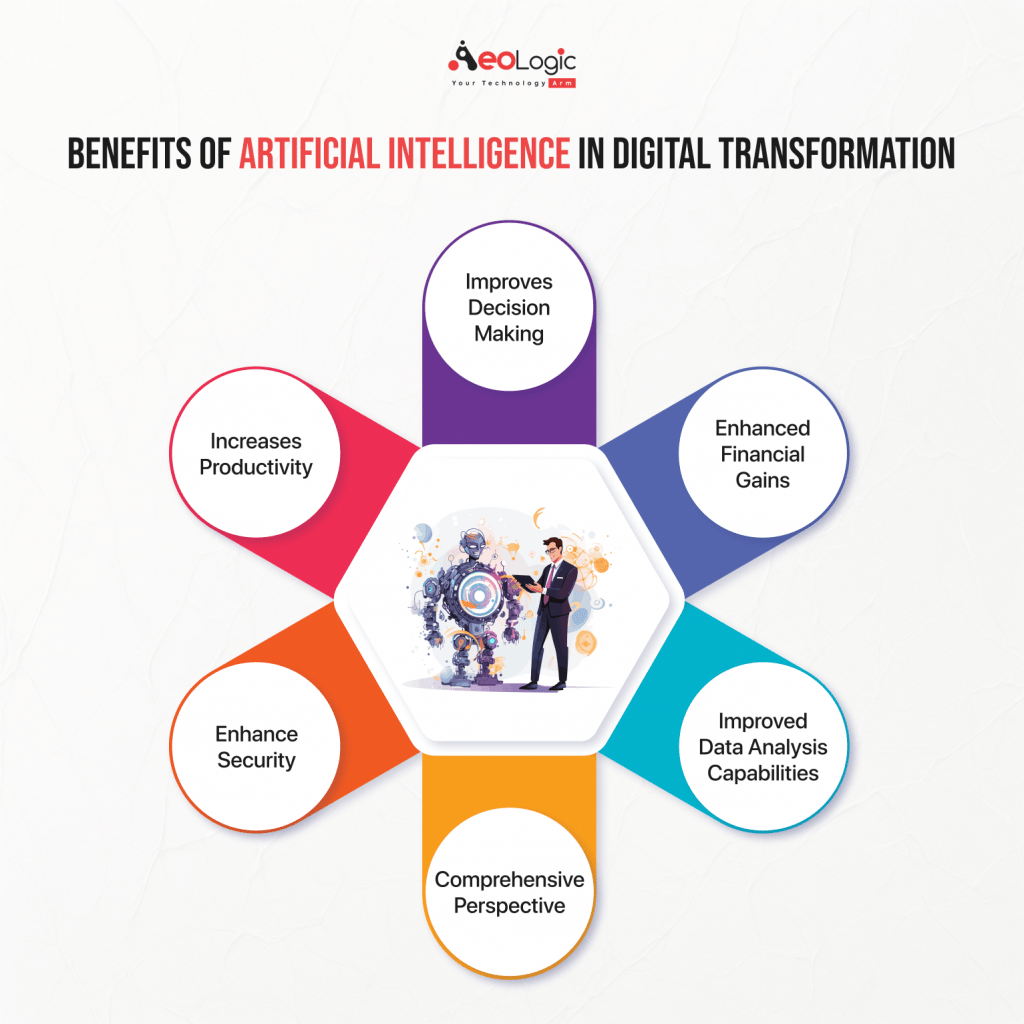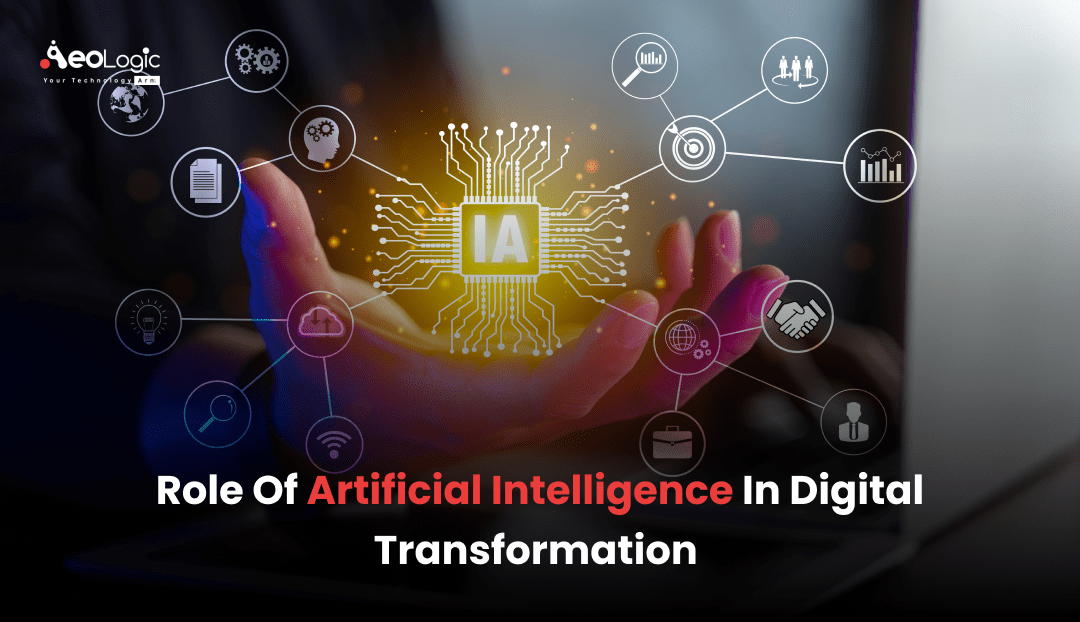Digital transformation is one of the world’s most new and incredible things. Every sector wants a digital transformation that increases its efficiency and productivity. Digital transformation also has a big impact on the global market as the digital transformation market is worth $880.28 billion. Global spending on digital transformation is expected to hit $3.4 trillion by 2026. 74% of organizations consider digital transformation a top priority.
Digital transformation is good but to make it best across all industries needs something more powerful. Artificial Intelligence has the capability that improve the digital transformation trend positively. AI has also had an impact on the business sector as 84% of businesses are exploring or currently using AI and machine learning for digital-first initiatives such as AI communication or implementing remote-first workspace.
In this article, we will explore how Artificial intelligence can contribute to digital transformation to improve it more. We will also discuss the benefits, challenges, and some examples of Artificial intelligence in digital transformation.
What is Artificial Intelligence In Digital Transformation?
Digital transformation refers to using digital technologies to change existing traditional and non-digital business processes and services or to create new ones to meet evolving market and customer expectations.
If we talk about AI in digital transformation, artificial intelligence has an important role in digital transformation via many aspects such as automating processes, analyzing data for insight, and enabling informed decisions. It drives efficiency, innovation, and adaptability and drives transformative change across industries.
How does AI Contribute to Improving Digital Transformation?
Artificial intelligence contributes to digital transformation to improve in various ways. A few important contributions of AI in digital transformation are mentioned below.
- Many digital analytics tools cannot analyze data and provide insights but with the help of AI, those analytics tools can properly analyze the vast amount of data.
- Manual support to customers cannot fulfill every customer’s needs whereas AI-powered chatbots can easily sort out the problem without too much labor.
- In different industries, there are many tools in terms of digital transformation that cannot contribute to increased productivity whereas integration with AI can automate various processes that improve overall efficiency.
- Sometimes decision-making is difficult and normal digital tools cannot help you whereas AI can do natural language processing that provides improved decisions for your problems.
Also Read: Digital Transformation in Banking: Benefits and Examples
Benefits of Artificial Intelligence in Digital Transformation

Artificial intelligence is probably the most powerful technology tool in the world It possesses some immense characteristics and benefits. Some of its key benefits in digital transformation are mentioned below.
1. Improves Decision Making
Decision-making is the most vital thing in any industry as a poor decision could ruin your industry and this problem cannot be solved with normal digital tools, where Artificial intelligence in digital transformation plays an important role in identifying and highlighting relevant information related to product performance, workflow optimization and predictable results that improve the decision-making aspect.
Artificial intelligence (AI) can assist in the identification and emphasis of crucial information about product performance, optimization of workflow, and prediction of consequences. An accurately delineated program can execute several simulations, enabling the estimation of the approximate performance of a new product during the initial six months of its existence, utilizing the existing data.
Armed with such knowledge, decision-makers may more effectively assess the remaining tasks, pinpoint potential obstacles, and make more precise projections and forecasts on the time and resources required to progress.
2. Enhanced Financial Gains
AI should not be seen as a substitute for human judgment, but rather as a powerful tool for maximizing efficiency and achieving desired outcomes in a timely manner. Manufacturers are perpetually confronted with the imperative to continuously produce functional items that comply with all rules within a predetermined (and typically diminishing) timeframe.
AI aids in optimizing product timelines through many means, such as preemptively identifying issues, conducting simulations, and cross-referencing with private data. AI software streamlines labor-intensive processes, allowing human resources to focus on the more cognitive aspects of product development. This not only reduces resource requirements but also enhances profit margins.
3. Improved Data Analysis Capabilities
Data sets can be vast and intricate, originating from several sources and geographic regions. Previously, it required significant time and staff to gather, process, and evaluate this data. Although humans should continue to play a crucial role in the ultimate evaluation, artificial intelligence (AI) may significantly expedite and optimize every stage of this procedure, providing data outcomes in a significantly shorter period.
AI is undoubtedly indispensable for major manufacturers with various assets distributed globally, as it enables the delivery of actionable insights in a timely manner.
4. Comprehensive Perspective of the Customer
The foundation of the digital realm is constructed upon data, which undergoes perpetual evolution in terms of its nature and origin. Historically, corporations utilized techniques such as cookies to acquire a deeper understanding of consumer behavior. Currently, privacy concerns and various other issues have resulted in a significant decrease in the utilization of cookies.
As a result, firms will require new technologies to gain a more comprehensive understanding of their consumers’ behavior. AI-enhanced software has the potential to become the next generation of technology, enabling decision makers to have a more comprehensive and improved understanding of their customers compared to what cookies were capable of.
5. Increases Productivity
Artificial intelligence in digital transformation plays a key role in streamlining product timelines by identifying proactive issues, running simulations, and comparing protected data. This operation overall makes a positive impact on productivity.
Automating specific guide responsibilities via Artificial Intelligence enables businesses to grow to be greater effective. This is validated by way of numerous research that show that AI increases productivity by 40 % or greater.
Artificial intelligence can increase productivity in several ways. They are capable of moving slowly and gathering facts fast, saving personnel time which will be consciousness on their middle missions. Additionally, they can perform complex calculations, become aware of styles, and automate habitual duties, giving companies an aggressive edge in gaining insights to make knowledgeable selections.
Furthermore, AI has revolutionized conversation within and out of doors of organizations via producing email content, occasion summaries, and other sorts of engagement communications.
By leveraging natural language processing, AI can draft emails that are contextually applicable and tailor-made to the recipient, for that reason lowering the time spent on drafting correspondences. It also can summarize key factors from conferences and activities, making sure green information dissemination and documentation.
This no longer enhances inner conversation but additionally fosters more potent customer relationships via personalized and timely interactions, in addition to boosting productivity and performance.
Also Read: Benefits of Digital Transformation for Small Businesses
6. Enhance Security
Normal digital tools cannot enhance security as they need some strong layer of web security on the data to protect. Artificial intelligence can create a strong layer of security on the desired data that cannot be breached easily.
AI assists enterprises in detecting and preventing the most complex computer threats. AI-powered security products aid organizations by using machine learning-trained engines.
- Scan systems for anomalous behavior (using pattern recognition).
- Predict how and where businesses are most likely to be compromised for proactive security.
- Notify IT technicians of potential dangers.
AI protects both commercial and personal accounts and systems with a variety of capabilities, including:
- Biometrics include facial recognition and fingerprint scanners.
- Double-factor authentication
- Generate, save, and automate complex passwords for computer security.
- Configure access control so that only authorized users can access your system.
If your IT systems become infected, AI can assist you restore them to their pre-event state with anti-malware and virus protection. It also employs NLP for predictive intelligence, alerting you to trends in industry-specific threats.
According to the Capgemini Research Institute, 69% of firms believed that AI advancements helped them withstand cyberattacks, and three out of four executives stated that AI pushed them to respond faster to data breaches.
Examples of AI-Based Digital Transformation
This is not a new thing that AI contributes to digital transformation as there are many real-life use cases examples of this. Here are a few examples of AI-based digital transformation mentioned below.
- Starbucks has integrated artificial intelligence into its app, which allows it to personalize its product offerings and offer rewards based on consumer preferences as only cloud-based systems cannot help them too much.
- Adobe is a Photoshop editing app that also includes AI to improve and enhance editing more than ever before.
- Amazon has used the power of AI analytics to understand customers better than they understand themselves. Using AI recommendations, they run personalized shopping experiences that leave traditional retail in the dust.
Challenges with AI in Digital Transformation
With the immense range of capabilities of AI in digital transformation, it also possesses some challenges. Here are a few challenges mentioned below.
- Lack of data can be challenging as sometimes data can be fragmented. inconsistent, incomplete, or inaccurate that changes the whole output that is concerning.
- Many have no skill to operate AI with the existing digital system which could be also challenging.
- Another one is the implementation cost of AI which is too much so it is also a concern as every sector cannot afford it.
Also Read: Major Challenges of Digital Transformation in Manufacturing
Final Words
The transformative potential of AI is limitless to accelerate digital AI-based digital transformation. Artificial intelligence is bringing unprecedented efficiency and innovation to companies in a variety of areas, from improving the customer experience to optimizing operations. Overall, Artificial intelligence has the upper hand over other tools to enhance the digital transformation aspects. So every industry should go with this tool that enhances their productivity and is also profitable for the whole world.
Unlock digital potential by working with a digital transformation company that prioritizes agility and innovation.

I’m Deepika Pandey, an SEO strategist and content writer with 6+ years of experience. I create SEO-friendly content that drives traffic and engages readers. I combine data insights with creativity to help businesses grow their online presence effectively.







